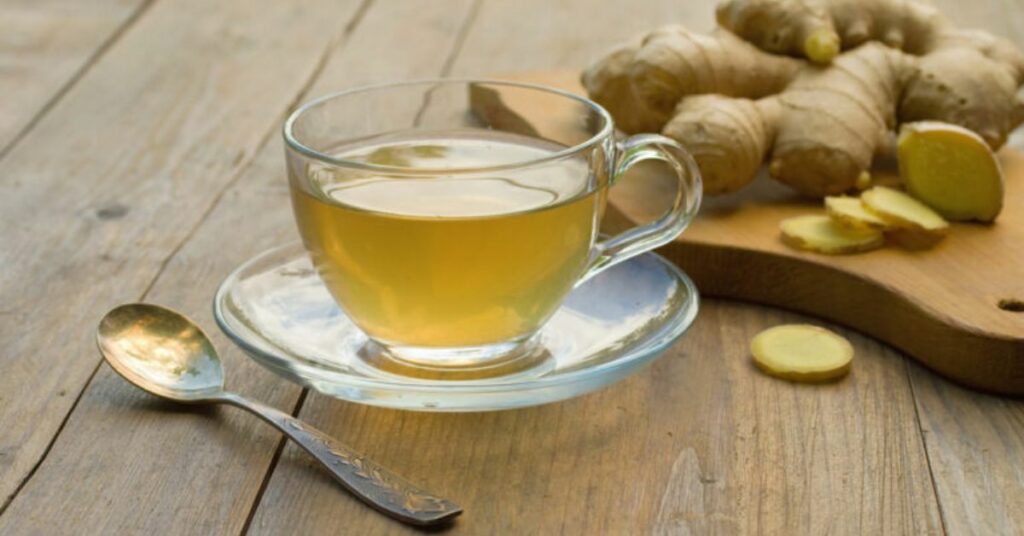You love ginger tea, but when is the best time to consume it? Consuming the fiery, soothing drink strategically has health benefits. The post will explain the facts and advise a ginger tea program for immunity, digestion, stomach settling, and bedtime relaxation.
Optimizing when you consume the best time to drink ginger tea can boost its effects, whether you’re fighting colds or nausea without medicines. Let’s create an intelligent ginger-sipping plan for your lifestyle.
In This Article
Why Best Time to Drink Ginger Tea? The Health Benefits Explained

Ginger tea is a tasty way to get several health benefits. Here are some of this spicy, fragrant drink’s benefits:
1. Reduces Nausea and Digestion
Gingerol and shogaol calm the digestive system and boost bile production to help digestion. According to research, Ginger is especially effective for pregnancy and, motion sickness nausea. Drinking ginger tea after meals can help digestion and calm an upset stomach.
2. Antioxidant Rich

Ginger root is rich in antioxidants and anti-inflammatories. These protect cells from free radicals and reduce bodily inflammation. Daily antioxidants from nutrient-dense whole foods like ginger safeguard your long-term health.
3. Immunity-boosting
Ginger is traditionally used to fight colds and flu due to its antibacterial and anti-inflammatory properties. Ginger may lessen respiratory illness severity and duration, according to a study. Ginger tea boosts immunity with vitamin C and antioxidants.
4. Reduces muscle pain

Research suggests ginger may naturally reduce exercise-induced muscle soreness and speed recovery. Joint and menstrual discomfort can be relieved by its anti-inflammatory qualities. Drink warm ginger tea after a workout or whenever you need relief.
5. Stress and Brain Health
Ginger may also improve brain health and reduce anxiety. According to research, ginger reduces chronic inflammation and oxidative stress in the brain. Ginger tea may protect brain cells, boost memory, and improve mood.
With this best time to drink ginger tea proven advantages, adding ginger tea to your self-care routine is a simple approach to improving your overall health. Drink up!
What Is the Best Time to Drink Ginger Tea for Optimal Wellness?

Ginger tea time is crucial. Drinking this relaxing herbal coffee at the right time can reduce inflammation, ease digestion, boost immunity, and improve sleep. The best time to drink ginger tea strategically to benefit from its therapeutic properties.
Morning
Enjoy a nice cup of ginger tea in the morning. Gingerol, ginger’s principal bioactive ingredient, boosts energy without caffeine’s jitters.
For reduced bodily inflammation, take ginger tea in the morning. Ginger reduces joint and muscular pain due to its anti-inflammatory effects. The tea also aids digestion, making absorbing nutrients from later-day meals simpler.
Afternoon
Need a midday boost? Get a hot cup of ginger tea around 3 pm when energy drops. Ginger tea compounds gradually enhance circulation and metabolism in the afternoon, improving alertness and focus without disrupting sleep.
Ginger tea in the afternoon may reduce bloating and indigestion after lunch.
Evening
Ginger tea’s immune-boosting and relaxing effects are best an hour before bedtime. Ginger promotes healthy perspiration, flushing pollutants, and pathogens via the skin.
Gingerol and shogaol boost antiviral activity while you sleep. Ginger tea heat helps ease stiff muscles and quiet the mind before bed.
Morning: Start Your Day Off Right

Brighten up! A hot ginger tea is the best way to start the day. The zingy, spicy flavor will wake you up, while the health advantages will help you succeed today.
Ginger tea in the morning aids digestion. Ginger soothes the stomach and boosts digestive juices and enzymes. According to the best time to drink ginger tea, Ginger tea before breakfast helps boost your system and reduce morning tummy aches.
It can improve your immune system after a long night’s sleep. Ginger’s antioxidants, anti-inflammatory, and antibacterial compounds help your body fight infections. What better defense for leaving?
The tea’s warmth also opens your airways for better breathing. Ginger may increase circulation and provide a slight energy boost, an excellent alternative to coffee to avoid the caffeine crash.
Enjoy your best time to drink ginger tea carefully as you wake up while the rest of the family sleeps. Before the rush, unwind. Read the morning news or check your email to settle in. Feel renewed, focused, and ready to conquer the day!
Quick ways to improve your morning ginger tea:
- For more vitamin C and flavor, add fresh lemon juice and honey to ginger tea.
- Brew tea strong for additional benefits.
Add 2-3 slices or teaspoons of grated fresh ginger root. Drink sitting up to aid digestion and prevent acid reflux. Try it with yogurt, porridge, or fresh fruit in the morning.
Ginger tea will get you invigorated, balanced, and ready for the day!
Afternoon: A Pick-Me-Up Without the Crash
Drinking ginger tea in the afternoon is beneficial. Many folks need more energy around 2 or 3 pm. A second cup of coffee may seem enticing. However, too much caffeine, incredibly late in the day, can cause sleep problems or a caffeine crash.
Instead of coffee, try warming the best time to drink ginger tea for a natural boost without the adverse effects.
Gives You a Boost

Key ginger components stimulate naturally. They gradually promote vitality and circulation. Ginger provides longer-lasting alertness than caffeine. It helps you endure the post-lunch lull and stay productive.
Aids digestion
Have you noticed how hefty lunches slow you down? Ginger tea helps! Its anti-inflammatory qualities gently stimulate digestion to reduce bloating. Better digestion boosts mental and bodily vitality.
Reduces Stress
In the afternoon, tension might leave you tense and exhausted. Clinically proven best time to drink ginger tea compounds relieve stress and anxiety. Decompress with a warm cup to focus on the day ahead.
Easy to Make
A fresh cup is brewed in minutes:
- Peel and thinly slice a 1-inch fresh ginger root
- Steep slices in hot water for 5-10 minutes without boiling.
Add lemon, honey, or sweetener to taste.
If you need an afternoon pick-me-up, make ginger tea instead of coffee. It provides prolonged energy and attention without jitters or crashes. Your warm cup helps you relax.
Evening: Calm and Unwind Before Bed
Ginger tea might help you unwind and get a good night’s sleep. When and how to consume the best time to drink ginger tea at night:
- The optimal time for evening ginger tea is 7:00–8:30 pm, allowing the energetic benefits to fade before bedtime. Ginger can keep you awake if you drink it close to bedtime. Finish your cup by 8:30.
- Create a calming blend by adding a slice of fresh ginger root or a half teaspoon of crushed ginger to chamomile, lavender, or lemon balm herbal tea. Include relaxing herbs like passionflower or valerian root. Ginger complements these soothing teas.
- Sip slowly – Incorporate relaxation into your nightly tea practice. Enjoy each drink while reading or listening to calming music.
- Enjoy a light snack with ginger tea, such as toast with nut butter, oats, or yogurt, to relax before bed. A little meal helps reduce nocturnal hunger.
- Reflect on the day through journaling, meditation, or reflection during calm nighttime hours. Ginger tea helps you focus and relax.
- Avoid electronics and screen time 30 minutes before bed for better sleep. Allow ginger tea to buffer gadgets and sleep.
- Relax in bed with ginger tea after your evening self-care regimen. Its warmth and familiar taste signal rest.
One of the most relaxing and nutritious ways to wind down is with a nice cup of ginger tea in the evening. The procedure might become your nighttime routine.
Before Meals: Stimulate Digestion
Ginger tea 30-45 minutes before meals can help your digestive system absorb nutrients. Why you should best time to drink ginger tea before meals:
- Activates digestive enzymes and gastric fluids. Ginger’s gingerol and shogaol boost food-digesting compounds.
- Increases bile production. Bile emulsifies and absorbs fats. Ginger tea before eating aids this procedure.
- Helps prevent overeating. Ginger is delicious. Ginger tea before meals reduces hunger and boosts satisfaction.
- Relieves occasional indigestion. Ginger’s anti-inflammatory properties calm the stomach lining before eating more.
- Improves nutrition absorption. Ginger tea improves digestion and helps your body use vitamins and minerals from food.
Simple ways to best time to drink ginger tea before meals:
- Brew a new cup 30 minutes before eating. Steep sliced ginger root or ginger tea bags for maximum flavor and benefits.
- Sip gently and attentively while waiting for digestion. This is an excellent moment to ponder or thank.
- Drink a cup before big meals. Ginger works well with protein, fat, and fiber-rich diets that demand more digestive fluids.
- Squeeze a lemon. Ginger tea is beneficial since vitamin C promotes iron absorption.
Regularly drinking ginger tea before meals feels nutritious and improves digestion and nutrition. Experience how drinking this fragrant, spicy drink before eating helps you feel lighter and more energized.
After Meals: Soothe Your Stomach
Ginger tea after meals helps digestion by reducing bloating, gas, and indigestion. Ginger relieves stomachaches with its anti-inflammatory qualities from gingerol and shogaol. The best time to drink ginger tea after meals aid digestion.
When and how to consume ginger tea after eating:
- Drink a cup for 30 minutes after a substantial meal. This lets ginger alleviate GI pain while digestion begins. Wait no more than 2 hours.
Take 4-6 ounces, or 1/2 to 3/4 cup. An already full stomach might be enlarged by too much liquid after eating—moderation matters.
- Sip ginger tea slowly to let the chemicals function in your digestive tract before adding an extra drink.
Add a squeeze of lemon. Plant-based iron absorption is improved by vitamin C. Lemon enhances ginger’s flavor.
- Add a small piece of fresh ginger root to red meat meals. Ginger’s enzymes digest animal proteins.
- Drink ginger tea after spicy or gas-causing foods. Ginger naturally soothes the gut.
- Try steeped ginger root for overeating or difficult digestion. The longer steep releases more gingerol and shogaol for stomach issues.
Adjust when and how much ginger tea to drink after meals based on when you have the greatest stomach difficulties. Finding the ideal ginger tea routine will aid digestion.
During Illness: A Natural Remedy
Ginger tea helps soothe a sick person. Ginger has relieved cold and flu symptoms for millennia due to its warming characteristics. Drinking this herbal infusion has many benefits:
- Relieves nausea and vomiting – Ginger reduces nausea and upset tummies. This helps with motion sickness, morning sickness, and stomachaches.
- Relieves throat pain – Ginger can soothe scratchy, inflamed throats from colds and flu due to its anti-inflammatory characteristics. Let ginger and honey coat and soothe.
- Fights infection – Antimicrobial gingerols fight viruses. This can reduce illness and speed recovery.
Frequently Asked Questions About the Best Time to Drink Ginger Tea
Should I drink ginger tea before or after eating?
Ginger tea after eating is recommended for indigestion and stomach pain. Ginger speeds food from the stomach to the intestines, calming the stomach. Ginger tea helps your body digest meals after a meal.
What about first thing in the morning- yay or nay?
A hot cup of ginger tea in the morning might increase your health! Ginger compounds boost metabolism and digestion, helping you burn more calories. Ginger may boost the immune system, according to a study. Make ginger tea as you wake up.
How about before bedtime? Is that a good idea or flawed?
We don’t recommend drinking ginger tea before bed because it may energize you. Ginger is thermogenic, raising body warmth. It may be harder to relax at night. If you insist on tea before bed, consider chamomile or lavender.
When’s the best time for ginger tea to reduce nausea?
Ginger tea may calm an uneasy stomach. Sipping it when nausea strikes can help. Ginger soothes upset stomachs due to its anti-inflammatory and digestive qualities. Keep ginger tea on hand, or make it when nausea strikes to feel better quickly.
Conclusion:
That’s it! Optimize your schedule and consume the best time to drink ginger tea at the proper moments to maximize its health advantages. Now you know when to sip to reduce inflammation, enhance digestion, or enjoy a warm cup of tea. Your system starts better in the morning. Early afternoons reduce cravings.
The evenings will relax you. It’s not rocket science. Pay attention to your body’s needs and schedule tea accordingly. You don’t have to follow a rigorous regimen, but these best practices will help you feel ginger magic. Start the kettle and enjoy your ideal cup of comfort!
Also Read:







